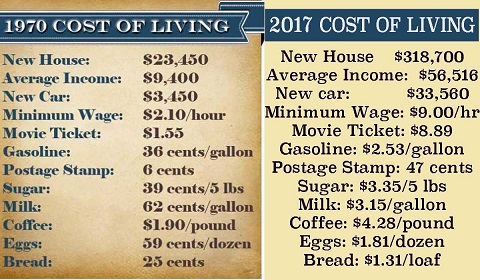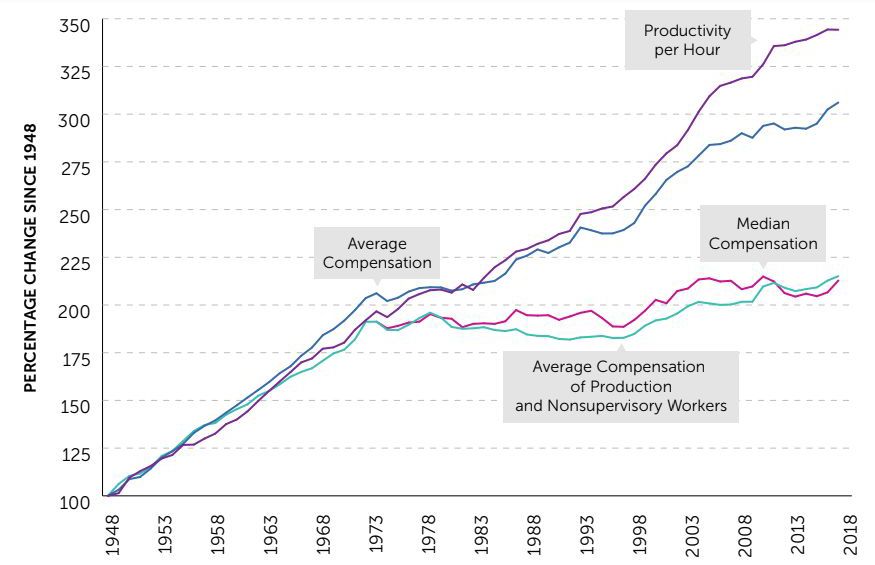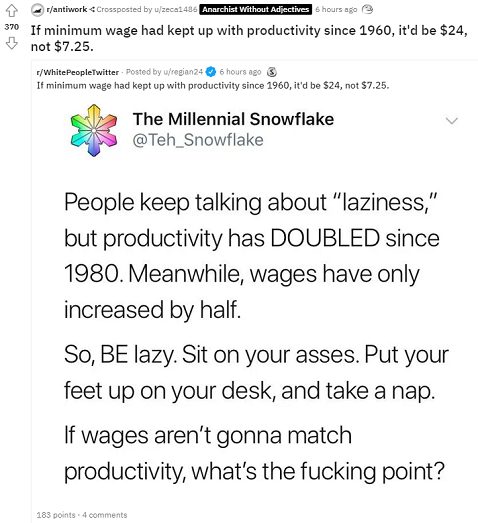Subreddit of the Week: antiwork
You may have seen a chart like the one on the right, which I took from Wikipedia’s page on workforce productivity. It shows labor productivity growth compared to wage growth since the end of the Second World War. What’s remarkable about it is how the two statistics track one another for a period of two decades or so, but then suddenly veer off, dramatically so for non-managerial workers. Workforce productivity starts growing much faster than nonsupervisory workforce compensation, as the latter curve flattens out.
What this means is that for a good couple of decades (the length of a generation), after 1948, as output per hour of work improved, so did the compensation for that work. The improvement in the value of labor was transferred to the workers themselves. But suddenly, in the early 1970s, gains in output were no longer matched by gains in wages. The improvement in the value of labor benefitted only those managing or employing the labor. This trend continues to this day, and is at the root of what is wrong with the economy, with its massive income and wealth inequality, and lack of economic opportunity for the working class.
There are actually a slew of economic indicators that shifted dramatically in the early 1970s, along with political and social indicators. They are all captured on a site here. This shift can be seen as the start of a new economic regime.
So what caused this shift to a new regime? Arguably, a shift in social priorities and the rise of a new generation into the workforce. In the early 1970s, that generation would have been the Baby Boomers. They brought a new inner-world, moralistic focus into American life. For Boomers, work was a personal mission, a matter of defining the self, not a matter of bargaining for rights and responsibilities as part of a collective.
Consequently, union membership declined as this generation entered the workforce, yet another indicator shift to join the ones on the site I linked above. Boomers were pursuing their own individual agendas through their work, not participating in building any kind of functioning system, as their union-joining forefathers had done. Boomers gave us the concept of the workaholic, someone for whom the work itself was the reward. Success in work became a status symbol for the inner-driven, wealth-obsessed yuppies of the 1980s – a sign of individual merit and self-worth.
By the time Generation X started working, labor rights had become completely passé. Gen Xers entered the workforce with an attitude of self-determination, as free agents, always looking out for the best deal for themselves. They gave us the concept of the perma-temp, the employee with no benefits or safety net, who drifts from employer to employer. As a Gen Xer might have put it, “it’s just a job.”
Gen Xers were the young adults of the boom times in the 1990s, when economic growth was high and productivity growth was on the rise. But in the new opportunistic economic regime, economic growth no longer acted as a rising tide to lift all boats. Instead, it was like a wave that some successfully rode, and others did not. Workers separated into economic winners and losers, with far more of the latter. Today, Gen Xers are middle aged, and one has become the richest person in the world. Many others have utterly washed out.
Now Millennials are the young adults in the workforce, doing much of the nonsupervisory production work which has experienced so little gain in compensation compared to the actual value it provides to employers. The “slackers” of Generation X, raised with low expectations, may have been willing to tolerate these circumstances. They may even, like Kevin in 1984’s Repo Man, have seen opportunity in them (see the video clip below). But not so Millennials.
Raised with high expectations, in a structured environment that rewarded following the rules, Millennials have not taken well to the free-for-all job market they have inherited from Boomers and Xers. Many Millennials have gone into massive debt for a college degree, only to discover that the jobs which a college degree opens up don’t pay well enough to justify the cost. Milestones of financial and personal success, such as buying a first home or starting a family, are elusively out of reach for Millennials, given the economic disparities that have grown over the course of the meritocratic, “neoliberal” regime established by Boomers and Xers.

Millennial disappointment with this state of affairs is visible in the many memes that fill social media feeds, comparing the economic circumstances of their generation with those of past generations and highlighting their disadvantages. Talk of “late stage capitalism” and enthusiasm for progressive politicians such as Bernie Sanders and Alexandria Ocasio-Cortez point to disillusionment with the current economic system. Could Millennials even be willing to embrace – gasp! – socialism? Red zone pundits would certainly like you to think so.
This brings me to my subreddit of the week, /r/antiwork. This subreddit has taken off in 2021, in concert with all the news stories about the “Great Resignation” and the labor shortage.
On /r/antiwork, the workers of reddit unite to commiserate over the awful conditions and abuses suffered by workers today. They post about the absurdities of our system, like costly health insurance that provides almost no benefit, and low salaries for jobs with high education requirement. They proudly tell stories about how they quit their last position, and encourage and praise union efforts.
Do reddittors really think we can reach a state where no one needs to work? Or is this subreddit simply a forum for venting about the miseries of living on the flattened curve of low compensation employment, where so many are stuck today?
I think that what this subreddit is really bringing to light is the pent-up demand for significant structural economic reform. A new generation with new priorities is in the workforce, and a new regime is required to meet their needs for an economy that provides fair rewards for work, and fosters financial security and not merely the opportunity for personal achievement.
Unfortunately, the only policy the U.S. government can come up with is to borrow and spend to keep the economy hot. While that might relieve the pain for some in the short term, it’s doubtful it will change all those economic indicators for the better in the long term, or quiet the dissenting voices of /r/antiwork. For that, major economic reforms would be needed, to transfer the value of labor back to the workers themselves. Maybe then they won’t mind coming to work so much.

